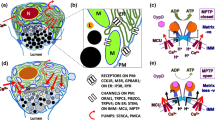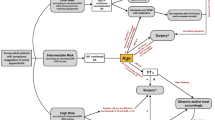Abstract
Background
To study the profile and long-term outcome of Indian patients presenting with acute pancreatitis and the possible risk factors for progression.
Methods
Consecutive patients with acute or recurrent acute pancreatitis seen in our department during July 2013 to December 2014 were included. Details of past episodes were collected and patients were followed up till March 2015.
Results
In the 97 patients included (mean age 47.2 [SD 16.9] years; 74 men), gallstones (37 [38.1%]) and alcohol (19 [19.6%]) were the major identified etiologies; the idiopathic (31 [32%]) group constituted a third of patients. Recurrences were more common with idiopathic etiology (14 patients out of 30 had recurrences [46.7%]) as compared to alcoholic (5 out of 19 [26.3%]) and biliary (4 out of 37 [10.8%]) pancreatitis and with mild index episode. Following the episode of acute pancreatitis, identification of chronic pancreatitis was more common with alcoholic (6 out of 18 [33%]) and idiopathic (9 out of 30 [30%]) etiology as compared to other etiologies. Longer duration of follow up, but not number of recurrent episodes, was associated with identification of chronicity in patients presenting as acute pancreatitis.
Conclusions
Out of 97 patients with acute pancreatitis, 27 (27.8%) developed recurrences with risk factors being idiopathic etiology and mild index episode. Eighteen of 97 (18.6%) patients had evidence of chronic pancreatitis on follow up, risk factors being the alcoholic and idiopathic varieties, and longer duration of follow up.
Similar content being viewed by others
References
WHO global status report on alcohol and health 2014. World Health Organization; http://www.who.int/substance_abuse/publications/global_alcohol_report/en/ accessed on 29/8/2017.
National Family Health Survey (NFHS-3) India 2005–06 [FRIND3-Vol1 and Vol2] - FRIND3-Vol1AndVol2.] http://dhsprogram.com/pubs/pdf/FRIND3/FRIND3-Vol1AndVol2.pdf accessed on 29/8/2017.
Unnikrishnan AG, Kalra S, Garg MK. Preventing obesity in India: weighing the options. Indian J Endocrinol Metab. 2012;16:4–6.
Thomson SR, Hendry WS, McFarlane GA, Davidson AI. Epidemiology and outcome of acute pancreatitis. Br J Surg. 1987;74:398–401.
Yadav D, O’Connell M, Papachristou GI. Natural history following the first attack of acute pancreatitis. Am J Gastroenterol. 2012;107:1096–103.
Xu H, Li Y, Yan J, et al. Severity analysis of acute pancreatitis based on etiology. Zhonghua Yi Xue Za Zhi. 2014;94:3220–3.
Zheng Y, Zhou Z, Li H, et al. A multicenter study on etiology of acute pancreatitis in Beijing during 5 years. Pancreas. 2015;44:409–14.
Halonen KI, Pettilä V, Leppäniemi AK, Kemppainen EA, Puolakkainen PA, Haapiainen RK. Long-term health-related quality of life in survivors of severe acute pancreatitis. Intensive Care Med. 2003;29:782–6.
Banks PA, Bollen TL, Dervenis C, et al. Classification of acute pancreatitis—2012 revision of the Atlanta classification and definitions by international consensus. Gut. 2013;62:102–11.
Al-Haddad M, Wallace MB. Diagnostic approach to patients with acute idiopathic and recurrent pancreatitis: what should be done? World J Gastroenterol. 2008;21:1007–10.
Mayerle J, Hoffmeister A, Werner J, Witt H, Lerch MM, Mössner J. Chronic pancreatitis—definition, etiology, investigation and treatment. Dtsch Arztebl Int. 2013;110:387–93.
Wu BU, Johannes RS, Sun X, Tabak Y, Conwell DL, Banks PA. The early prediction of mortality in acute pancreatitis: a large population-based study. Gut. 2008;57:1698–703.
Balthazar EJ, Ranson JH, Naidich DP, Megibow AJ, Caccavale R, Cooper MM. Acute pancreatitis: prognostic value of CT. Radiology. 1985;156:767–72.
Marshall JC, Cook DJ, Christou NV, Bernard GR, Sprung CL, Sibbald WJ. Multiple organ dysfunction score: a reliable descriptor of a complex clinical outcome. Crit Care Med. 1995;23:1638–52.
Senapati D, Debata PK, Jenasamant SS, Nayak AK, Gowda SM, Swain NN. A prospective study of the bedside index for severity in acute pancreatitis (BISAP) score in acute pancreatitis: an Indian perspective. Pancreatology. 2014;14:335–9.
Talukdar R, Bhattacharrya A, Rao B, Sharma M, Nageshwar Reddy D. Clinical utility of the revised Atlanta classification of acute pancreatitis in a prospective cohort: have all loose ends been tied? Pancreatology. 2014;14:257–62.
Lankisch PG, Breuer N, Bruns A, Weber-Dany B, Lowenfels AB, Maisonneuve P. Natural history of acute pancreatitis: a long-term population-based study. Am J Gastroenterol. 2009;104:2797–805.
Singh VK, Wu BU, Bollen TL, et al. A prospective evaluation of the bedside index for severity in acute pancreatitis score in assessing mortality and intermediate markers of severity in acute pancreatitis. Am J Gastroenterol. 2009;104:966–71.
Khanna AK, Meher S, Prakash S, et al. Comparison of Ranson, Glasgow, MOSS, SIRS, BISAP, APACHE-II, CTSI scores, IL-6, CRP, and procalcitonin in predicting severity, organ failure, pancreatic necrosis, and mortality in acute pancreatitis. HPB Surg. 2013, 2013:367581.
Vipperla K, Papachristou GI, Easler J, et al. Risk of and factors associated with readmission after a sentinel attack of acute pancreatitis. Clin Gastroenterol Hepatol. 2014;12:1911–9.
Frey CF, Zhou H, Harvey DJ, White RH. The incidence and case-fatality rates of acute biliary, alcoholic, and idiopathic pancreatitis in California, 1994-2001. Pancreas. 2006;33:336–44.
Choi JH, Kim MH, Oh D, et al. Clinical relevance of the revised Atlanta classification focusing on severity stratification system. Pancreatology. 2014;14:324–9.
Zhang W, Shan H, Gu Y. Recurrent acute pancreatitis and its relative factors. World J Gastroenterol. 2005;11:3002–4.
Gullo L, Migliori M, Pezzilli R, et al. An update on recurrent acute pancreatitis: data from five European countries. Am J Gastroenterol. 2002;97:1959–62.
Gao YJ, Li YQ, Wang Q, et al. Analysis of the clinical features of recurrent acute pancreatitis in China. J Gastroenterol. 2006;41:681–5.
Nøjgaard C. Prognosis of acute and chronic pancreatitis—a 30-year follow-up of a Danish cohort. Dan Med Bull. 2010;57:B4228.
Nøjgaard C, Becker U, Matzen P, Andersen JR, Holst C, Bendtsen F. Progression from acute to chronic pancreatitis: prognostic factors, mortality, and natural course. Pancreas. 2011;40:1195–200.
Skinazi F, Lévy P, Bernades P. Does acute alcoholic pancreatitis always reveal chronic pancreatitis? Gastroenterol Clin Biol. 1995;19:266–9.
Ammann RW, Buehler H, Bruehlmann W, Kehl O, Muench R, Stamm B. Acute (nonprogressive) alcoholic pancreatitis: prospective longitudinal study of 144 patients with recurrent alcoholic pancreatitis. Pancreas. 1986;1:195–203.
Poddar U, Yachha SK, Borkar V, Srivastava A. Is acute recurrent pancreatitis in children a precursor of chronic pancreatitis? A long-term follow-up study of 93 cases. Dig Liver Dis. 2017;49:796–801.
Author information
Authors and Affiliations
Corresponding author
Ethics declarations
Conflict of interest
RK, PA, DCD, AJ, and TG declare that they have no conflict of interest.
Ethical approval
All procedures performed in a study involving human participants were in accordance with the ethical standards of the institutional research committee and with the 1964 Helsinki declaration and its later amendments or comparable ethical standards.
This article does not contain any studies with animals performed by any of the authors.
Informed consent
Informed consent was obtained from all individual participants included in the study.
Rights and permissions
About this article
Cite this article
Kalaria, R., Abraham, P., Desai, D.C. et al. Rate of recurrence in Indian patients presenting with acute pancreatitis and identification of chronicity on follow up: Possible risk factors for progression. Indian J Gastroenterol 37, 92–97 (2018). https://doi.org/10.1007/s12664-018-0818-0
Received:
Accepted:
Published:
Issue Date:
DOI: https://doi.org/10.1007/s12664-018-0818-0




